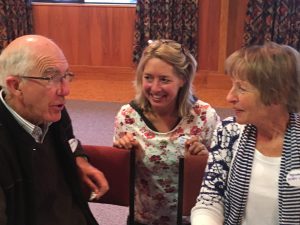WelCom May 2017:
The 2016 Kaikōura 7.8 earthquake that struck the upper east coast of the South Island early Monday 14 November and rocked the rest of New Zealand left Kaikōura’s 2000 permanent residents without water supplies and sewer systems and with no easy way out. Local resident and Chair of the Catholic Stewardship Group, Deb Lawson, shares her story.
For me life after 14 November has been a rollercoaster from which I have been unable to get off. Six hours after the initial 7.8 quake we vacated our 100-plus-year-old Echelon home of five years and moved into our garage-sleepout. We didn’t realise at the time it would become our new residence. Nearly six months later, we are still in this dwelling and looking at it as a long-term solution for our situation. On reflection, most days have a positive slant since the earthquake, but sometimes the mood drops into spaces where I wonder how it could get any worse. Thankfully, these moments pass quickly. I am fortunate to be blessed with a caring husband, a job which keeps me guessing, animals that make me smile and endless gardens to care for.
Many of our vulnerable population, such as the elderly and families with children, initially, were flown out of Kaikōura during the aftermath of the earthquake. Many returned just before Christmas as the aftershocks and infrastructure settled. For some it took several weeks before power, water and sewage were restored. The supermarket had limited supplies for several weeks before the shelves were restocked as supplies were slow to arrive. My husband and I went for several months before needing to buy loo paper due to the generous food parcels received. Funnily, this served as a bit of a benchmark for our personal journey in the recovery process.
Kaikōura calls it ‘the new normal’ and for most locals, the place looks and feels very different from what it used to be. Yet, contrastingly, to a visitor’s eye the town may appear to be functioning well, because much of building damage and disrepair is on country roads and side streets. Despite the small scale of our town, locals are more aware of how shops have relocated, pubs (three) have closed doors and we’ve lost our Mitre 10 shop, which was a mainstay for our DIY folk. Other businesses such as cafés and restaurants are very vulnerable due to changeable population numbers as fewer tourists are traveling through. A different kind of visitor is beginning to appear in our shops, as road workers and others involved in rebuilding our infrastructure are settling into a presence here.
Recent challenges coming to life are road conditions due to weather and insurance settlements. Neither were priorities at the start, but now feel as if they take up a lot of ‘brain space’ during an already mentally full day. The condition of our access roadways, SH1 and the Inland Road, are both rough and rugged with only a low threshold required to close one or the other, due to slips and repairs. It changes daily and we’ve recently seen ourselves completely cut off again from a deluge of rain and wind on fragile ground over a 24-hour period. There are thousands with insurance claims from this earthquake event. Most are still awaiting the conversations that would allow homeowners to move forward.
Almost six months on, it is still amazing how something so violent as a 7.8 earthquake had so little physical injury associated with it as many of this magnitude have had elsewhere. In fact, and speaking as a health professional, we were indeed very fortunate. What we are confronted with now is the emotional toll, which is something subtler. I write this on the eve of the great Passion readings of Palm Sunday, and the reflection is asking: ‘Lord, what do you want from me?’ Written for Holy Week, it also is a reminder of using our lives as a conduit for Christ’s love and compassion to others, which is now required even more so in our fragile and broken community. It is my hope that from these life experiences our ‘ears may be alert to listen like a disciple’ (Isaiah 50) so that we can be there for others in their time of need.
There have been community initiatives to strengthen connections; for young children, there have been music and dance groups allowing parents time to visit and children to socialise. For adults, there has been a jazz festival followed by a weekend sport and health expo, which has brought all age groups together. Catholic Social Services sponsored workshops for primary and secondary teachers and staff to introduce a project called ‘Storm birds’. This initiative helps students deal with the effects of change caused by a natural disaster such as an earthquake or flood. The workshops showed the teachers how to facilitate sessions with their students in the classroom.
The people here are resilient says Fr Julian Wagg, resident priest in Kaikōura. ‘But they are very private about their needs as they live with obvious concerns and uncertainties about their homes, livelihoods and life in general. Especially stressful are the agonies and unknowns of dealing with such matters as insurance claims. The people are still finding comfort and consolation in one another and trying to gain a sense of momentum but there are psychological, emotional, physical and spiritual needs to be met. There is help available, but the difficulty can be knowing how and where to find it. Our immediate focus is identifying people in need and finding them the help that is available.’
